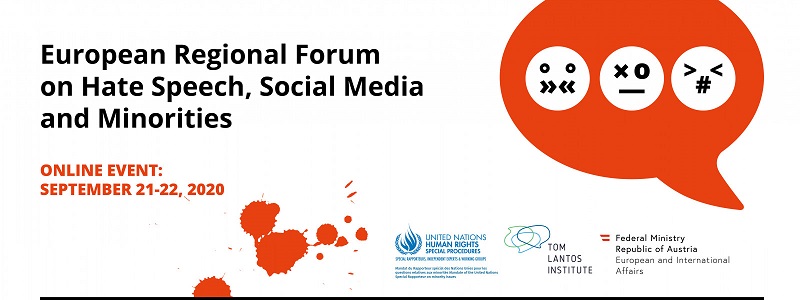On 22 September 2020, Mr. Jeroen Zandberg held a speech at the European Regional Forum highlighting the human rights violations against the Cham concerning the lack of protection from hate speech.
The United Nations Special Rapporteur on Minority Issues and the Tom Lantos institute organised the European Regional Forum on 21-22 September 2020, with the topic: ‘Hate speech, social media and minorities’.
The United Nations states that the objectives of the conference are: “The main purpose of the European Regional Forum on “Hate Speech, Social Media and Minorities” is to provide European regional insights, which will feed into the thematic work of the Special Rapporteur on minority issues for his report to the 46th session of the UN Human Rights Council in March 2021. Furthermore, discussions at the Regional Forum will also inform the work and recommendations of the 13th Session of the UN Forum on Minority Issues, which will take place in Geneva, on 19 and 20 November 2020.”
Distinguished guests,
I wish to highlight the situation of the Cham-Albanians where it relates to hate speech in Greece.
The Cham-Albanians are a distinct multi-religious cultural group which lived in the area they called Chameria for many centuries when it was a part of the Ottoman Empire. In 1913, this area became part of Greece, despite the fact that a large part of the population identified themselves as Cham-Albanian. An important chapter in the modern history of the Cham-Albanian people was their expulsion during World War Two, when a large part of the population fled to southern Albania, where many remain until this day. It resulted in the fact that they are only a small minority community in present day Epirus, north-western Greece.
Greece has well-developed anti-racism legislation and criminalizes hate crimes and hate speech through specific laws. The country has implemented the European Council Framework Decision (2008/913/JHA): “On combating certain forms and expressions of racism and xenophobia by means of criminal law”, through two laws: law 927/79 and later amended by law 4258/14. Hate crimes and hate speech are actively monitored and penalized. Furthermore, numerous government agencies collect this data and make it available to the general public. Overviews of this data are also presented on the website of the OSCE’s Office for Democratic Institutions and Human Rights (ODIHR). Despite these efforts to combat racism I wish to highlight an important omission in the interpretation and implementation of the anti-hate crime and hate speech laws.
Article 2 of the Greek antiracism law mentions that speech which denies the severity of war crimes, crimes against humanity, the Holocaust and Nazi-crimes, where the behaviour is directed against a specific group, should be considered hate speech. This applies to crimes which are recognised by international courts or the Greek Parliament. However, the crimes committed against the Cham-Albanian community during World War Two are generally not included into this framework, which means that the Cham-Albanian community is not protected by this law. This is often the case in public discourse where attempts by the community to address their lack of representation and recognition, be it in education, the use of the Albanian language, or the efforts to get their confiscated lands and goods returned, is met by trivialising the committed crimes against the community during World War Two. It goes even further; the Cham-Albanian community is often targeted as being an accomplice instead of a victim of war crimes, whereby their claims for human rights are subsequently deemed null and void. This false narrative, which is widely promoted within Greece, does not only harm the Cham-Albanian community, but also does not do justice to the spirit and ideals of the law to combat hate speech. Blaming the Cham-Albanian community for many of the war crimes during World War Two is a means to discriminate against the community and should be considered hate speech, just like in all other situations where the law is applied.
Recommendation:
- Trivialising and denying the crimes against humanity committed against the Cham-Albanian community should be criminalised as hate speech, just like all of the other crimes mentioned in article 2 of the anti-racism law.
- Blaming the Cham-Albanian community for being the perpetrators instead of the victims of war crimes should also be considered hate speech.
Thank you,
Jeroen Zandberg
